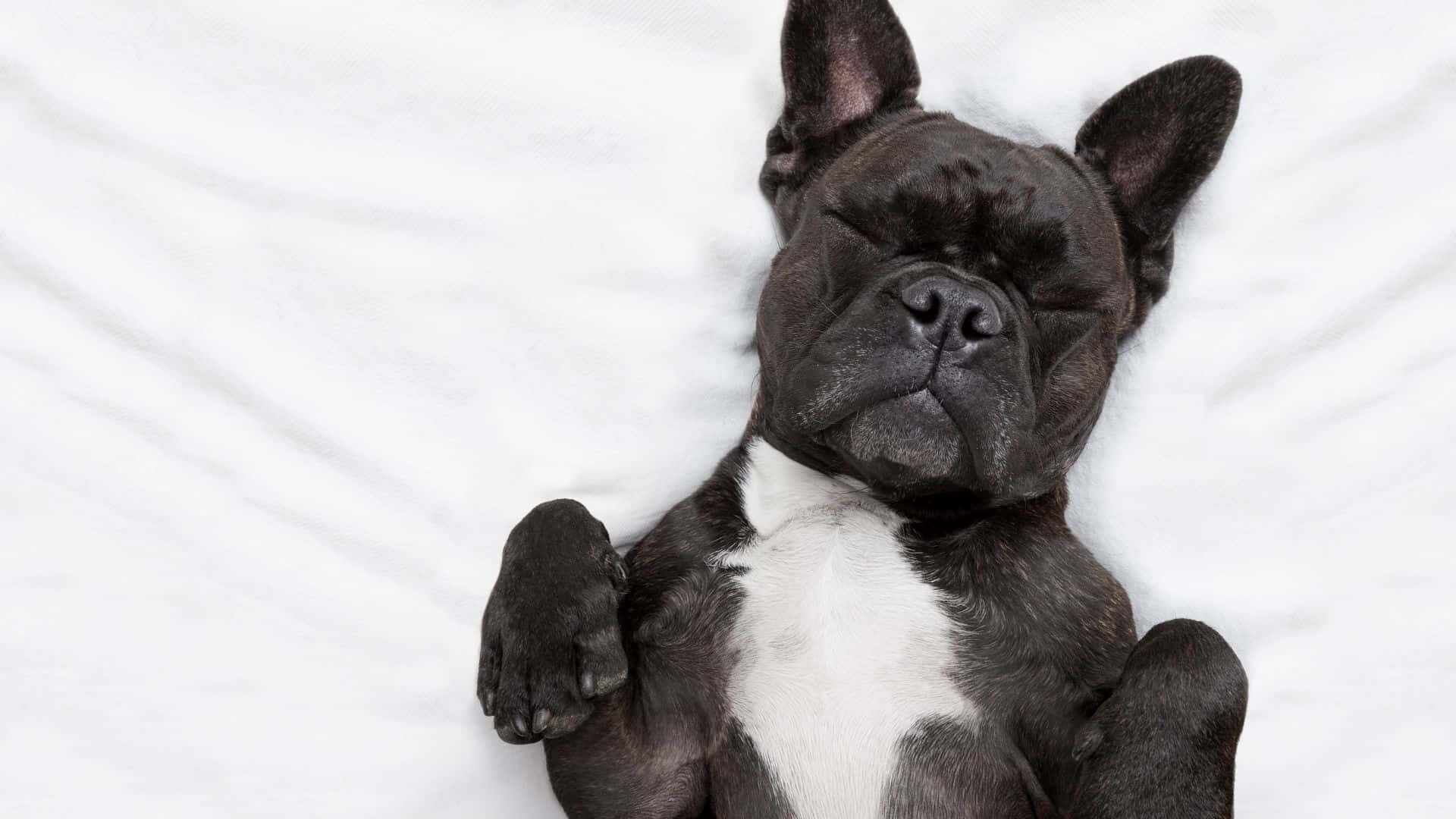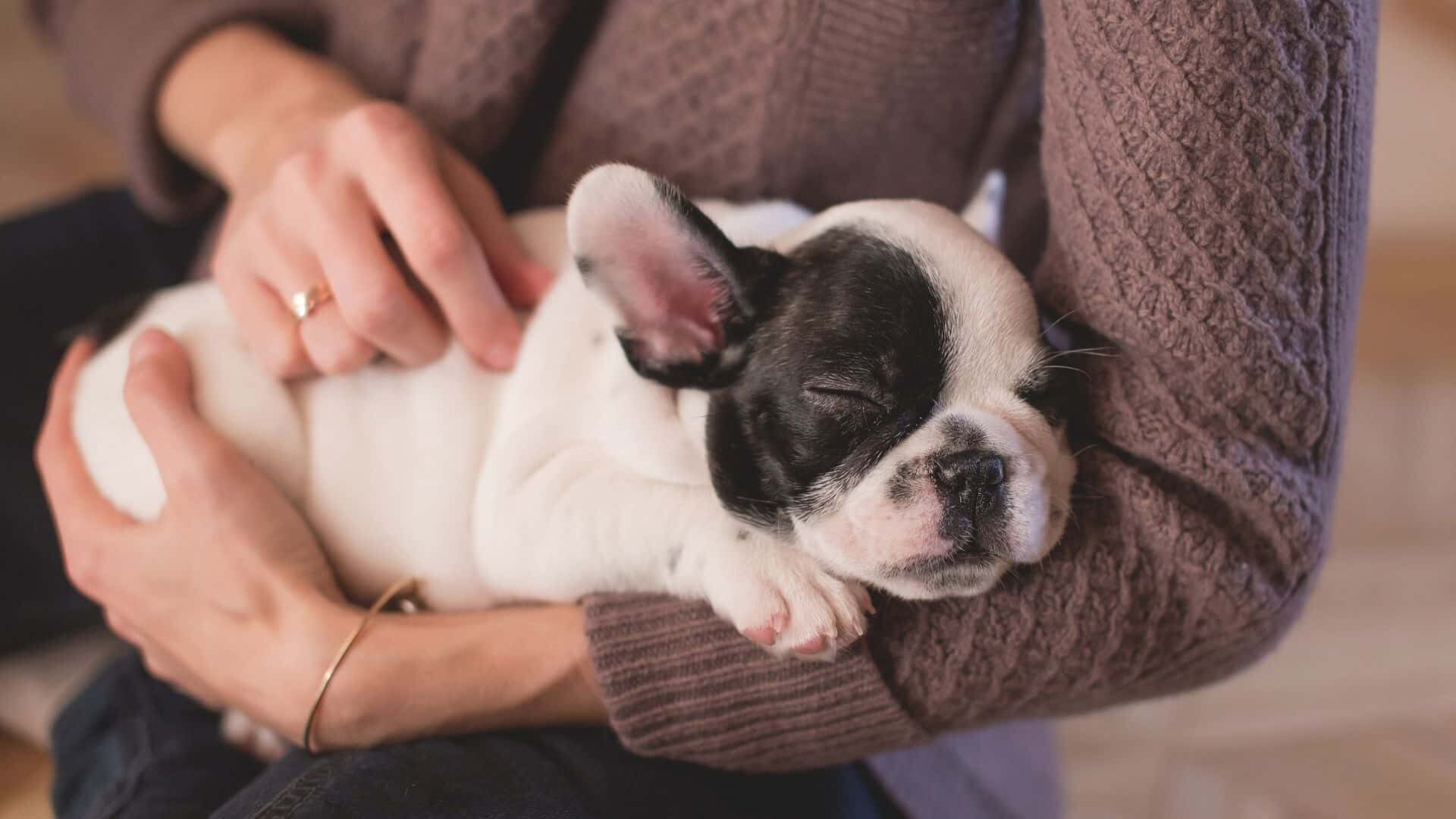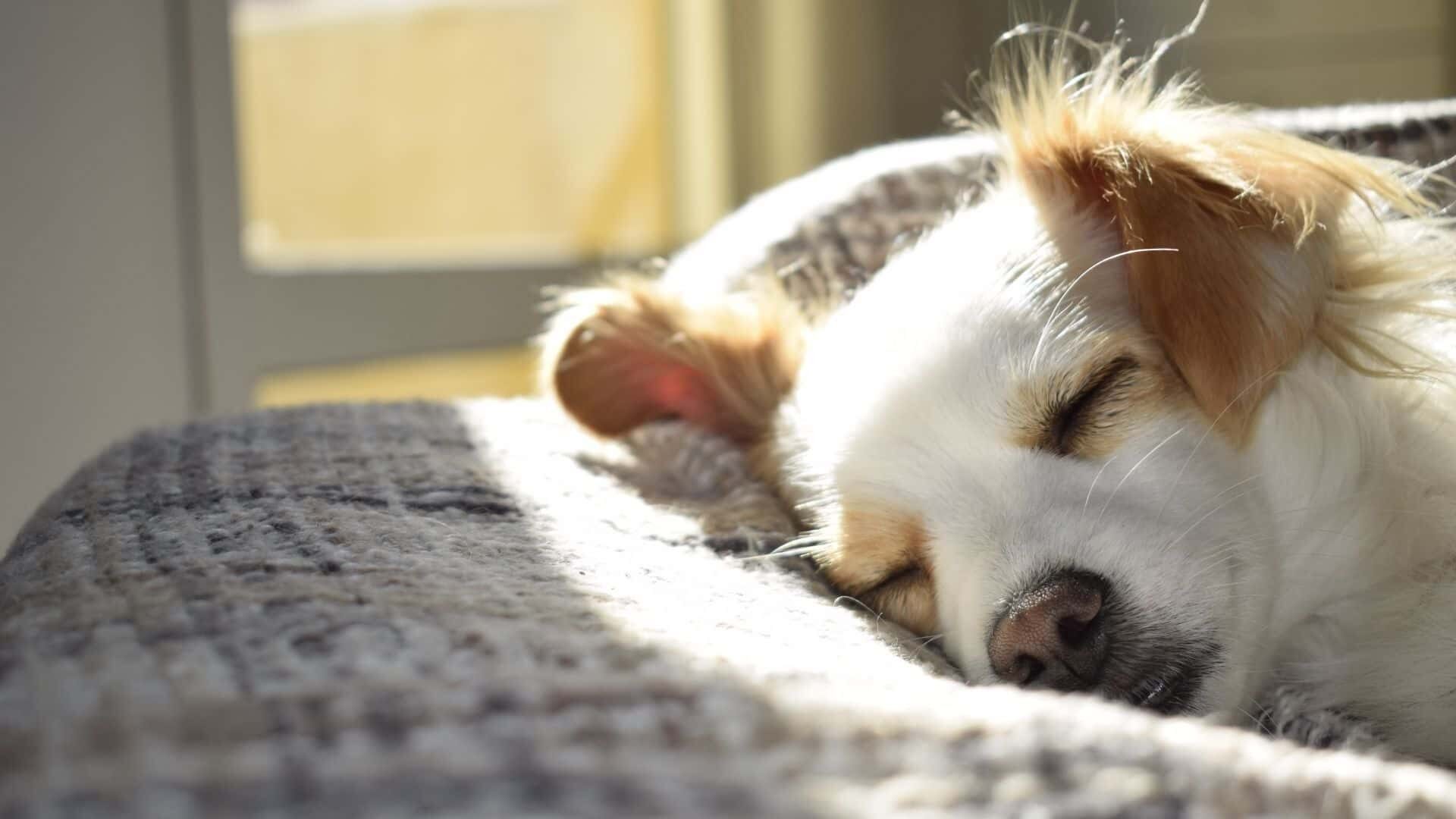If you notice your pet urinating when he or she is sleeping or resting, they may have a condition known as urinary incontinence. Spayed female canines in their middle years are more likely to experience urinary incontinence.
Inappropriate elimination, such as urinating in the home or outside the litter box, is not the same as urinary incontinence, despite the fact that both can be caused by underlying medical issues.
Owning a puppy is an exciting but intimidating experience, and it’s only natural that you’ll have a lot of concerns and questions about how to properly raise one. Whether or not a dog should pee in their sleep is one of these questions.
One of the most critical aspects of training a dog is housebreaking. In the midst of all of this, what exactly counts as “normal?” What about sleeping puppies? If a puppy pees in their sleep on a regular basis, they may have an underlying medical concern.
Why do dogs pee when they sleep?

Bed-wetting is not natural in puppies, even if they occasionally do it due to a weak bladder. You should be concerned if your puppy pees in their sleep because they are already housetrained or because they are sick. The easiest approach to find out what your puppy needs is to take it to the vet for a checkup.
The bladder muscles of a puppy are not fully developed until it is four to six months old. Due to their inability to contain their urine for long periods of time, pups may have difficulty using the bathroom outside.
As your puppy gets older, they will be able to contain their urine for longer periods of time. Urinating away from their bed is also a preference, so they should get out of bed to do it.
In the event of an accident, use a high-quality dog pee removal spray to remove all stains and odors.
Every few hours, your puppy will need to go outside to relieve himself. However, this is very typical. Having your dog wet his bed because he doesn’t wake up to urinate isn’t considered natural. When the dog’s bladder sphincter muscles become too weak to control urine, this condition occurs. It is possible that such a problem will arise if:
- Infection of the urinary tract
- “Neutering Incontinence” for dogs that were neutered as puppies.
- Injuries to or degeneration of the spinal cord
- Diabetes and renal illness are two common causes of frequent urine.
- Ailment of the prostate
- Ureter calcifications and tumors
If you discover that your dog is peeing while they are sleeping, you should take them to the vet right away so that a diagnosis may be made. It is possible to die from diabetes or kidney disease, even if a weak bladder is the only contributing factor.
You need to consult your veterinarian if your dog is showing any signs of incontinence.
Incontinence can be brought on by urinary tract infections or other painful illnesses, even if the accidents are rare and only produce a little amount of pee. As a result, it’s critical to catch them early.
Most of the time, a veterinarian is required to diagnose and treat the underlying cause of your pet’s behaviour problems.
One more reason to see your veterinarian is that incontinence can be a sign of a more serious problem.
No matter what the issue may be, your veterinarian will be able to provide you with specific recommendations on how to handle your pup’s current situation
8 Reasons why dogs pee in their sleep

Some of the more common causes of puppies peeing their beds:
Till four to six months of age, puppies lack fully developed bladder muscles. As a result, puppies’ bladders tend to be weaker, which might lead to incontinence. Most puppies, on the other hand, prefer to relieve themselves outside of their sleeping areas. There are a number of possible causes for your puppy’s nighttime urination.
1. Spaying/neutering
Pregnant dogs are more likely to have accidents in the house after being recently spayed or neutered. Spaying or neutering causes a quick change in hormone levels, which is why this is the case. The urethral sphincter relaxes as a result of hormonal changes, releasing urine unintentionally. This is most common during rest, when the muscles are at their most relaxed. Typically, this tendency subsides within 10-14 days.
Do not penalise your dog if they have an accident in the house following their surgery. While they are recovering, make sure that you continue to teach them the art of urinating in the open with leash exercise. Instead of consuming a significant amount of food or liquid in one sitting, encourage your dog to consume smaller amounts more frequently.
2. Infection of the urinary tract
Your dog may not be aware that he is peeing as he sleeps because of the irritation induced by a urinary tract infection. An infection of the urinary tract can cause a dog to become excessively thirsty, which in turn causes him to urinate more frequently, even if he doesn’t wake up when he needs to pee.
3. A bad night’s sleep
Peeing in your puppy’s sleep could be the result of an unpleasant dream. It is estimated that roughly 64 percent of the dogs who suffer from this sleep condition are under the age of 1.
It’s common knowledge among dog owners that their pets make noises and twitch when they sleep. As a matter of fact, for some dogs, their dreams are so vivid that they cause them to snarl and yelp.
Veterinary behaviourists believe that dogs who suffer from intense nightmares are more likely to have REM sleep disorder. Puppies and adult dogs may pee in their sleep if their dreams are excessively violent or frightening.
4. Hormonal disorders
If your dog has hypothyroidism, she may not be able to control her bladder because of a hormonal imbalance caused by the condition. For dogs with hormonal abnormalities, you may also notice changes in their appetite, weight, or energy.
It’s possible that your dog has a hormonal imbalance and that you’ll need to do a battery of blood tests in order to discover its fundamental cause. As a result, your veterinarian may prescribe a hormone replacement prescription for your dog.
5. Spinal disease
A spinal cord disorder may cause a dog’s bladder to become less sensitive.
There is a possibility that your pet suffers from incontinence during the day and at night.
SCI is a progressive disease that affects the spinal cord.
6. Stones in the urinary tract
Your dog’s bladder stones could start out little but they can quickly grow in number and size. When your dog has bladder stones, you’ll immediately discover why he has urination problems.
7. Diabetes
If your dog is showing signs of developing diabetes, he or she may pee all over the place, including during the night. Lethargy and weight loss may also be indicators of diabetes, despite an increased hunger.
8. Diseases of the Brain
Urinary incontinence can be caused by a variety of neurological conditions. For example, it could be caused by brain disease or lesions; spinal problems; or a malfunction of the nerves that control the bladder. Canine cognitive dysfunction (CCD), often known as doggy dementia, is a prevalent cause of incontinence in dogs. Fecal incontinence can occur in dogs with neurological problems.
If your puppy pees in his sleep, what should you do?
It’s advisable to take your puppy to the vet right away if they’re constantly peeing in their sleep. You don’t have to worry if your dog experiences incontinence because of a weak bladder. Preventing your puppy from becoming critically ill by addressing the underlying cause as fast as possible is essential.
Make sure that your puppy’s bedding is cleaned and replaced periodically until you see a veterinarian. Because a wet bed might hold bacteria that can exacerbate any infection that your dog has, it is best to avoid one at all costs. The puppy’s incontinence should not be punished. Possible that they are unable to regulate their bladder, and punishment will not help.
Your dog’s urinalysis may be required by your vet. This is a standard test that measures the chemical composition of your dog’s urine. For urine analysis, there are four components: concentration, pH (acidity), color/turbidness (cloudiness), and cell/solid material analysis. A urinalysis can assist you figure out if your dog has a UTI or kidney disease. Urinalysis can rule out a urinary tract infection (UTI) or kidney disease if something else is causing your puppy’s incontinence.
If you notice that your dog is experiencing problems with bladder control when sleeping, you should keep an eye out for any other odd behaviours. It’s possible that a more serious problem is at play if the water use in a day rises if leaks are discovered.
Your dog should be taken to the vet as soon as possible once you’ve observed him for signs of illness. However, even if your pet has a weak bladder on its own, the matter will need to be addressed as soon as possible in the event that it is combined with another more serious problem. Prior to prescribing any specific medicine, your veterinarian may demand a urine sample. Discussions on treatment will begin after the results of the tests are in.
Owners of dogs should not disregard the fact that their pets have peed in their sleep.
Even if you assume that a few dribbles of urine aren’t enough to cause concern, you’d be wrong. This is due to the conditions that may be generating this symptom that are not readily apparent.
Make an appointment with your veterinarian to discuss the problem. You’ll be quizzed about your dog’s current health and behaviour. Dogs may be examined in the office if they have a problem.
What can you do if your dog keeps urinating while it’s sleeping?
As soon as you can, take your dog to the vet to have the underlying cause of his symptoms assessed. A weak bladder on its own is not a life-threatening medical condition, but when it’s accompanied by other health issues like renal disease or diabetes, it certainly can be fatal if it isn’t treated right away.
Dogs peeing in their sleep is caused by incontinence, and this can be an issue for dogs who have been neutered or spayed. You may be surprised to learn this, but ageing dogs can also lose control of their bladders just like humans do. However, this isn’t always the case, since you can find puppies with incontinence. There is no excuse for delaying seeing a veterinarian and waiting for an accurate diagnosis.
The risk of urinary infection, crystals, and stones can be reduced by feeding a wet diet and boosting water consumption. In the same way, treating a bladder infection as soon as it occurs is recommended to avoid further harm to the organ. Prescription diets may be necessary for some dogs, particularly those that are prone to crystallization.
Having your dog neutered can prevent the growth of their prostate and lower the risk of developing prostate disease.
In dogs who are at risk (such as Shih Tzus and Dachshunds), we should try to keep them as lean as possible and consider installing ramps to decrease the amount of time they spend jumping from high places.
Watch 9 weird dog behaviors explained | Video
Does a puppy pee in its sleep when it’s just 8 weeks old?
Does that sound like something you’ve seen before? Even if you don’t see it, puppies as young as 8 weeks or as old as 4 months have been known to accidentally pee during the night. They may be too exhausted to recognise that their bladder is full, so they pee while asleep. This is more common with puppies. During puppyhood, potty training is of the utmost importance.
What is the maximum amount of time a puppy can go without peeing while it is sleeping?
Most puppies can retain their bladder as long as they are months old unless you have a very small breed (i.e., a three-month-old pup can hold it about three hours, a four-month-old about four hours).
Is a puppy going to wake up in the middle of the night to pee?
It is safe to say that yes. Every night, make sure you wake your puppy up to go potty. Puppy bladders are nearly full by the time they reach 4 to 6 months of age, allowing them to hold urine for longer periods of time. Dogs can sleep through the night if they are properly trained in toilet habits.
How many times a night should I wake my puppy to go potty?
Be sure to get up in the middle of the night to take your puppy outside to relieve himself. Dogs under the age of four months just can’t keep their bladders full all night…. After all, it’s important to take your puppy out at least once a night as a puppy.
My pet keeps urinating in the middle of the night. What should I do?
Initiate a bedtime ritual that includes turning off all lights, including those inside and outside your home. Because you’re getting ready to retire for the evening, this will serve as a gentle reminder to the kids that it’s time to use the restroom. Try to get out of bed earlier than they do. For them, it’s all about the potty if waking you up brings them the pleasure of an empty bladder.
Conclusions

If you ever had the thought, “Help, my dog pees in her sleep,” you’ll be prepared with this list of possible causes.
Taking her to the veterinarian for a full examination is the next logical step. We sincerely hope that this information may be of assistance to you as you attempt to resolve your dog’s urinary problem.
Bottom up
Please comment below about your ideas and share this “Why Is My Dog Peeing in His Sleep: 8 Reasons and Solutions” article with your friends.
Stay tuned with our website to find out more exciting stuff. Don’t forget to check out our previous articles too.
Until the, Read about, Top 10 Pros and Cons of Putting Water in Dog’s Kibble: Guide





